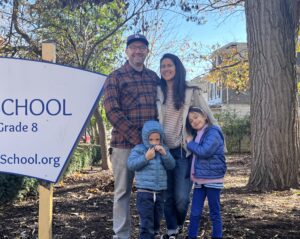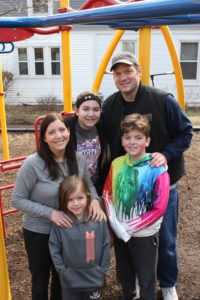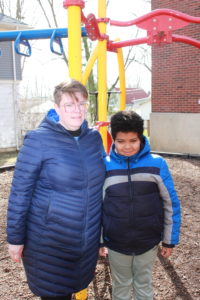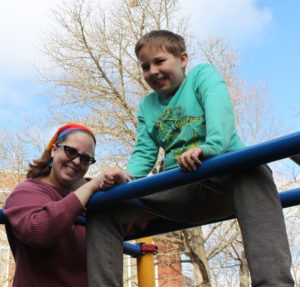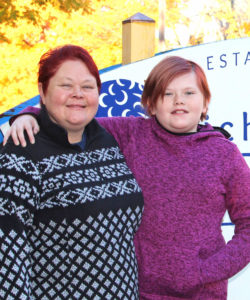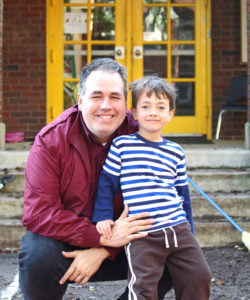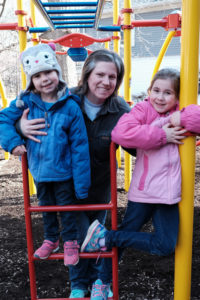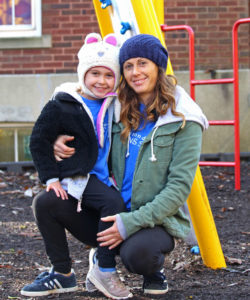Richmond Friends School was extremely pleased to introduce 7th and 8th grades to our academic offerings in 2016. This exciting classroom addition, guided by teachers Greg Guffey and Lizzie Labadie allows older students to take advantage of RFS’ tradition of high-quality experiential learning. Take a moment to learn about our approach to middle school, peek at their weekly schedule, or even learn about ways the students are evaluated. If you feel that this environment would be beneficial for your child, please contact Becky Dimick Eastman, Head of School, at 765-966-5767 or headofschool@richmondfriendsschool.org.
Sample Student Evaluation
7th and 8th Grade Supply List 2024-2025
Meet the teachers:
Greg Guffey (Seventh to Eighth Grades Lead Teacher)
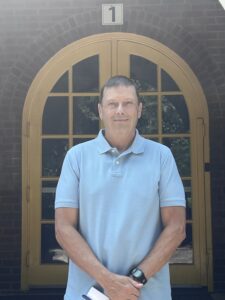 Greg is a graduate of Ball State University. He earned his B.S. in Social Studies Education in 1989, and later he earned M.A. degrees in both Special Education and Educational Administration and Leadership through Ball State University. Greg is a 34 year veteran teacher and a New Castle native. He spent the majority of his career teaching in the Anderson Community School district as a History Teacher and as a Dean of Students. Greg loves to build positive relationships with his students and he tries to make learning fun! He enjoys connecting past events to help his students have a better understanding of the world around them today. In his spare time he enjoys writing and recording music and spending time with his family.
Greg is a graduate of Ball State University. He earned his B.S. in Social Studies Education in 1989, and later he earned M.A. degrees in both Special Education and Educational Administration and Leadership through Ball State University. Greg is a 34 year veteran teacher and a New Castle native. He spent the majority of his career teaching in the Anderson Community School district as a History Teacher and as a Dean of Students. Greg loves to build positive relationships with his students and he tries to make learning fun! He enjoys connecting past events to help his students have a better understanding of the world around them today. In his spare time he enjoys writing and recording music and spending time with his family.
Lizzie Labadie (Seventh to Eighth Grade Math) Lizzie graduated from the University of North Texas with a B.A. in Secondary Mathematics Education and is currently working on her Masters in Middle School Mathematics. She has taught middle school math for the past 6 years in Houston, Texas. Her favorite things about teaching are being able to make math accessible and empowering her students to become lifelong problem solvers. In her free time, she loves to hike, cook, read, and practice yoga.
Lizzie graduated from the University of North Texas with a B.A. in Secondary Mathematics Education and is currently working on her Masters in Middle School Mathematics. She has taught middle school math for the past 6 years in Houston, Texas. Her favorite things about teaching are being able to make math accessible and empowering her students to become lifelong problem solvers. In her free time, she loves to hike, cook, read, and practice yoga.
Middle School Education Ethic
The RFS 7th and 8th grade middle school program strives to inspire lifelong leaders and learners grounded in the Quaker principles of simplicity, peace, integrity, community, equality, and stewardship. Faculty and staff facilitate the exploration of these values as we help all students develop their own voice and academic pursuits. Our preschool – 8th grade model allows middle school students to be both challenged and rewarded through their natural interactions with younger students, making them integral ambassadors of our school.
Hands-on learning and individualized instruction create an environment that inspires students to make real world connections. Our project-based classroom calls on kids to think critically and solve relevant problems. Teachers work hard to provide the foundational academic and social skills to prepare our students for high school and beyond.
Critical Thinking:
We believe that deeper learning comes from a focus on critical thinking, including analysis, synthesis and evaluation of information. We teach students to evaluate current and relevant ideas through questioning, citing evidence from various sources, and applying their understanding through writing, class discussions and group projects.
Experiential & Interdisciplinary Units:
Essential to our curriculum is the belief that learning is an expedition and should not be confined by subject or by walls. Project-based and experiential learning occur in every class, and we rely on our community resources to aid in teaching our students: guest speakers, local organizations, and universities. Twice a year, our students take part in weeklong enrichments, one focused on the humanities and the other on STEM. During this time, they are introduced to an in-depth study in these fields. Our end of the year class trip and frequent field trips throughout the year are used to enhance learning (See our spontaneous trip to Illinois to view the total eclipse below!).
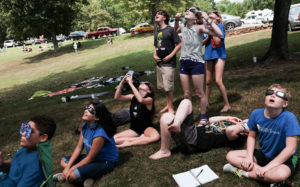
Project-Based Learning:
It all starts by asking, “How does flipping the light switch make a light bulb turn on?” A simple guiding question leads to a multi-month long exploration into energy transfers and conservation, alternative sources of energy, and the construction of some creative Rube Goldberg machines. This student centered project-based learning is at the heart of what we consider to be good teaching and learning at RFS because it calls on students to work collaboratively and think critically. Our goal is to immerse students in experiences that are both memorable and will help them see the big picture of what they are learning (See photo below of students working with Cope Environmental Center to enhance habitat for local bee populations).
Community Involvement:
We focus on building community in three ways. First, we want our students to understand that a cohesive and trusting classroom begins with each of them being an active and mindful participant (See photo of team building exercises at Camp Yale below!). Next, we seek opportunities to collaborate with the younger classes at RFS by sharing our learning and by building community with social events. Additionally, we embrace any chance to partner with local organizations or individuals including guest speakers, service learning opportunities and programming.


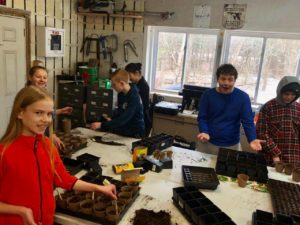
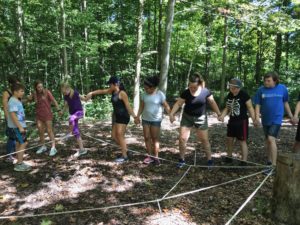
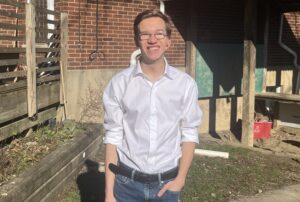
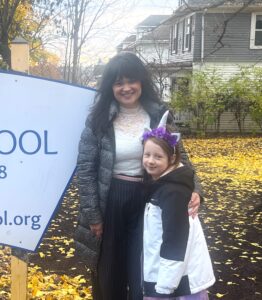
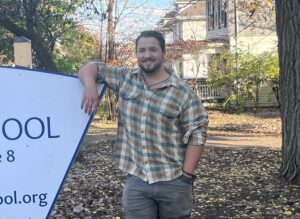 "When we place nature at the center of our community, we come to realize the true abundance of the world we live in. This school puts these seeds of hope in its students; it changes how they move through the world, and it changes the communities they enter for the better.”
"When we place nature at the center of our community, we come to realize the true abundance of the world we live in. This school puts these seeds of hope in its students; it changes how they move through the world, and it changes the communities they enter for the better.”